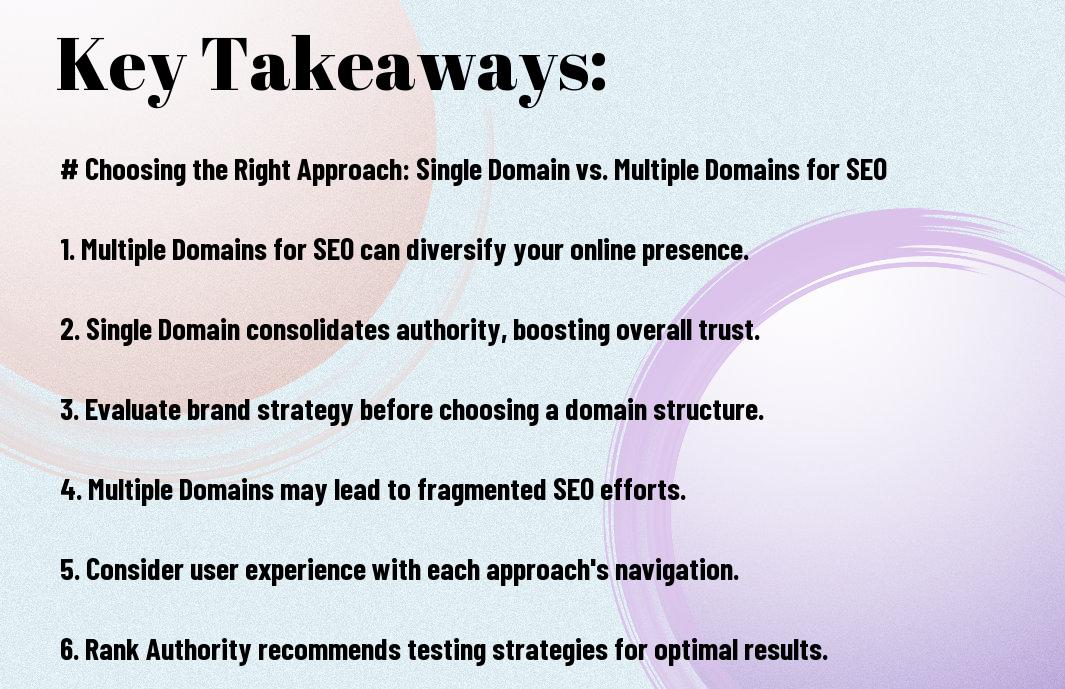Just when you think you’ve got your SEO strategy figured out, the decision looms between using a Single Domain or Multiple Domains for SEO. Understanding the strengths and weaknesses of each approach is imperative for your online presence. By focusing on a single domain, you may streamline your efforts and enhance your brand visibility. Conversely, opting for multiple domains might allow for niche targeting, but it could spread your resources thin if not managed properly. In this post, you will explore both strategies, examining their impact on search rankings and the potential risks involved. Ultimately, the right choice will depend on your specific business goals and resources.

Key Takeaways:
- Single Domain Approach: Choosing a single domain for SEO can simplify your strategy. It allows for a unified branding and pooling of authority. This is particularly effective if your business has a focused niche.
- Multiple Domains for SEO: This approach can help target diverse markets or product lines separately. However, managing multiple domains may involve extra resources. It is important to weigh the advantages of better segmentation against increased complexity.
- Long-term Strategy: When you opt for multiple domains for SEO, think ahead to how this aligns with your business goals. Analyze which approach supports your growth and marketing endeavors more effectively over time.
—
When considering the best approach for your SEO strategy, it’s important to evaluate both the Single Domain and the Multiple Domains for SEO models. A single domain can create a stronger brand presence and easier user navigation. In contrast, multiple domains allow for diversified marketing tactics, suitable for different audiences. Therefore, your choice will largely depend on your specific circumstances and aims.
At Rank Authority, we understand the dynamics of these approaches and how they can impact your online visibility. Thus, we recommend conducting thorough research. This will help you make an informed decision that aligns with your business model.
You may also want to consult resources like Moz or Search Engine Journal to gather more information on SEO strategies. Make sure to consider how your approach will influence your overall SEO presence and long-term success. Ultimately, both paths can lead to visibility and growth, but the right one for you will depend on your unique context and objectives.
—
In the end, considering the implications of your choice—Single Domain versus Multiple Domains for SEO—can significantly affect your web rankings. Evaluate your goals, resources, and market approach carefully. With tools like those provided by Rank Authority, you can enhance your strategy and stay ahead of your competition.
Understanding SEO
The concept of Multiple Domains for SEO is integral to mastering search engine optimization. SEO, or Search Engine Optimization, refers to the techniques employed to enhance your website’s visibility on search engines like Google. Understanding how SEO works will empower you to make informed decisions regarding your digital strategy. Essentially, it focuses on optimizing both the content and structure of your site to attract quality traffic, improving your chances of ranking higher in search results.
The Importance of Domain Structure
Any effective SEO strategy hinges on a well-organized domain structure. Your domain serves as your online identity and plays a significant role in how search engines interpret and index your site. A clear and concise domain structure can lead to improved user experience, consistent branding, and a better likelihood of your content being ranked favorably. Therefore, choosing between single or multiple domains can significantly impact your SEO efforts.
Key SEO Metrics
Structure your SEO strategy by focusing on important metrics that determine your website’s performance. These key SEO metrics include organic traffic, bounce rate, and conversion rates. Monitoring these types of metrics will allow you to gauge how effectively your current approach is working, whether as a single domain or with Multiple Domains for SEO. In turn, you can make necessary adjustments to maximize your results and drive more targeted traffic.
Metrics are important for evaluating your SEO effectiveness. By analyzing organic traffic, you understand how many visitors come from search engines, indicating your content’s relevance. Similarly, a high bounce rate may signal that users aren’t finding what they need, urging you to refine your approach. Lastly, conversion rates indicate not just traffic but also effective engagement and fulfillment of your business goals. In sum, keeping a close eye on these metrics can enhance your domain strategy significantly.

Single Domain Approach
One effective method to consider for your online presence is the Single Domain Approach. This strategy focuses on building your brand and website authority under a single domain, making it easier for you to manage your SEO efforts. Unlike Multiple Domains for SEO, which can dilute your efforts, a single domain allows you to consolidate your traffic and link-building, enhancing your overall visibility. As you navigate the complexities of online marketing, this approach can simplify your strategy while fostering a coherent brand identity.
Advantages of Single Domain Strategy
Advantages of a Single Domain Strategy include improved brand recognition, easier management, and enhanced SEO efforts. When you dedicate all your resources to one domain, you create a stronger online presence. This can lead to better search engine rankings and increased traffic. Additionally, with all of your content and marketing efforts in one place, you can more effectively track performance and optimize accordingly. Overall, this strategy can save you time and yield better results.
Potential Drawbacks
Any approach comes with its challenges, and the Single Domain Strategy is no exception. You may encounter issues like limited keyword targeting or vulnerability to algorithm changes. Focusing solely on one domain means that if your rankings drop due to updates or penalties, your entire online presence could suffer. Furthermore, as your business evolves, you might find it difficult to cater to diverse audiences within a single site. Balancing your focus is vital to maintaining an effective strategy.
The limitations of the Single Domain Strategy can pose significant risks. If your domain experiences a sudden drop in rankings, your entire visibility may be affected, leading to decreased traffic and potential sales losses. In contrast, using Multiple Domains for SEO can offer more flexibility, allowing you to target various niches. Furthermore, if you expand visually or geographically, a single domain may hinder your ability to connect with different audiences. Therefore, it’s important to carefully evaluate your long-term business goals with the expertise of professionals at Rank Authority, who can help navigate these complexities effectively.
Multiple Domains Approach
To enhance your digital footprint, you might consider the Multiple Domains for SEO approach. This strategy involves creating separate websites for different niches or markets. While it can expand your reach, it also necessitates careful planning to ensure that each domain effectively serves its purpose. With the right execution, you can cater to a wider audience and tap into various segments of the market.
Benefits of Using Multiple Domains
Domains allow businesses to target multiple specific audiences, improving relevancy and engagement. By focusing on niche markets, you can create tailored content that resonates better with users. Additionally, separate domains can enhance your brand visibility, as each site has the potential to rank for different keywords. More domains mean more opportunities to drive traffic and generate leads.
Challenges and Considerations
Challenges arise with the Multiple Domains for SEO strategy, particularly in management and resource allocation. You must assess whether you can consistently maintain quality across all domains. Monitoring performance can be daunting, as it requires separate analytics and tracking efforts. Furthermore, managing backlinks without spreading your authority too thin can become complex.
Consequently, you need to prioritize attention and resources effectively to safeguard each domain’s performance. Failing to manage them properly can lead to diluted SEO authority, resulting in lowered rankings across the board. Additionally, if your resources are limited, it’s important to *strategically select* which domains will receive the most focus. Working with an experienced team like Rank Authority can help ensure your multiple domains work coherently toward your overall marketing objectives. Ultimately, find a balance between broadening your online presence and maintaining strong domain authority.
Comparative Analysis: Single vs. Multiple Domains
Your choice between Single Domain and Multiple Domains for SEO can significantly impact your website’s performance. The following table outlines key differences to help you decide:
| Aspect | Single Domain | Multiple Domains |
|---|---|---|
| SEO Authority | Consolidates authority | Dilutes authority |
| Content Management | Easier management | More complex management |
| Traffic Distribution | Centralized traffic | Distributed traffic |
| Brand Consistency | Stronger branding | Weaker branding |
Performance Metrics
Domains can measure success through various performance metrics such as organic search traffic, conversion rates, and keyword rankings. Single domain strategies often yield higher visibility and consolidated metrics, while multiple domains can complicate tracking and analytics. Thus, the performance aspect requires careful consideration based on your goals.
Long-term Strategy Evaluation
Against the backdrop of your business goals, evaluating a long-term strategy is important. Multiple domains may offer diversification, yet they come with complexity and might lead to scattered efforts.
Evaluation of your overall strategy is vital for sustained growth. Using Multiple Domains for SEO can diversify your online presence, but be aware of the risks involved, such as brand dilution and potential visibility issues. If well-managed, multiple domains may open up new traffic channels and help target specific audiences. However, it’s critical to ensure that each domain serves a purpose aligned with your long-term vision.
Rank Authority emphasizes the importance of evaluating every aspect of your SEO strategy to maximize your business potential. Therefore, understanding the implications of your domain choices is critical as you make decisions that impact your site’s future.

Case Studies
Unlike many assumptions around the Multiple Domains for SEO approach, several case studies illustrate how brands have effectively harnessed the power of both single and multiple domains. Here is a brief overview:
- Brand A: Increased organic traffic by 60% using a single domain.
- Brand B: Achieved a 45% higher domain authority with effective multiple domains.
- Brand C: Grew its global visibility by 75% through localized content on multiple domains.
- Brand D: Sold more than 30% additional products via targeted campaigns on separate domains.
You can examine deeper into how these strategies work by reading Multilingual Websites: Single domain vs multiple domains?.
Successful Single Domain Implementations
Before exploring single domain strategies, note that brands maximize SEO benefits by focusing on one primary site. This concentrated approach enables streamlined content management and enhances user experience, directly boosting search engine rankings.
Successful Multiple Domain Implementations
Across various industries, companies leveraging multiple domains have seen significant gains in targeted marketing efforts. By targeting specific regions or demographics, these brands tap into niche markets effectively, driving higher conversion rates.
Even though implementing multiple domains poses challenges such as potential duplicate content issues and increased maintenance demands, successful brands closely monitor their strategies. Optimizing each domain for distinct audiences and ensuring proper redirects can reduce risks while enhancing visibility and authority in search engines. The key lies in understanding your audience’s needs and aligning your SEO efforts accordingly to ensure maximum benefits.
Best Practices for Domain Strategy
Not all domain strategies are created equal, especially when it comes to Multiple Domains for SEO. To ensure success, you should evaluate your options thoroughly and align your approach with your business goals. Consider your target audience, branding, and your ability to manage multiple sites effectively. Aim for a clear, consistent strategy that allows for future growth and easy maintenance. Partnering with an expert like Rank Authority can help you implement best practices that will elevate your domain strategy while optimizing your web presence.
Content Management
Across various domains, it is necessary to maintain a well-organized content management system. This allows you to deliver relevant content tailored to each audience while ensuring that your keyword strategy is consistent across all platforms. When implementing Multiple Domains for SEO, use CMS tools that simplify updates and content sharing to improve your efficiency and reduce redundancy.
Linking Strategies
Strategy plays a significant role in maximizing your link building efforts across your domains. Aim to establish a robust connecting strategy that enhances authority and visibility.
Practices such as internal linking among your domains can create a web of relevant content, reinforcing your SEO efforts. However, you should be cautious of excessive backlinking, as it may lead to penalties. Prioritize quality links, ensuring they come from reputable sites, as this strength is necessary for your SEO strategy. Accordingly, use dofollow links effectively, as they drive traffic to your domains, boosting your overall search presence. Ultimately, linking strategies are key to enhancing your site authority while ensuring your strategy remains aligned with your SEO goals.

Summing Up
Following this discussion on Multiple Domains for SEO, you should consider your long-term goals and audience before deciding. Choosing between single and multiple domains can significantly impact your online presence and visibility. If your brand focuses on diverse product lines, multiple domains may serve you better. However, consolidating your efforts into a single domain could enhance your site’s authority and SEO performance. Ultimately, the right choice hinges on your specific needs and marketing strategy. If you are uncertain, consulting with Rank Authority can provide valuable insights tailored to your business.
FAQ
Q: What are the advantages of using multiple domains for SEO?
A: Utilizing multiple domains for SEO can provide several key benefits. Firstly, it allows businesses to target different niches or markets more effectively. Each domain can be optimized for specific keywords, increasing visibility and potentially attracting a broader audience. Additionally, having multiple domains can help with brand segmentation. This approach is particularly effective if a brand offers diverse products or services. Each domain can build its own authority. However, it requires careful management to ensure quality content across all platforms. For more insights, check out Moz.
Q: How do I choose between a single domain and multiple domains?
A: The choice between a single domain and multiple domains depends on your business model and goals. If your offerings are diverse, multiple domains may be more suitable. This enables tailored content for different audiences. On the other hand, a single domain can strengthen overall brand authority and simplify SEO efforts. It’s crucial to analyze your target market and key performance indicators before making a decision. Tools like Google Analytics can be very helpful. They provide valuable data for informed choices.
Q: Can using multiple domains for SEO negatively impact performance?
A: Yes, using multiple domains can pose certain challenges. Managing multiple websites requires extensive time and resources. Each domain needs unique content and SEO strategies which can be overwhelming for smaller businesses. Furthermore, spreading your link-building efforts across numerous domains may dilute your overall authority. Instead, consider consolidating efforts if resources are limited. It’s often more beneficial to invest deeply in one domain rather than spreading yourself thin. Always assess your team’s capacity. Rank Authority can assist you in making the best choice for your needs.













